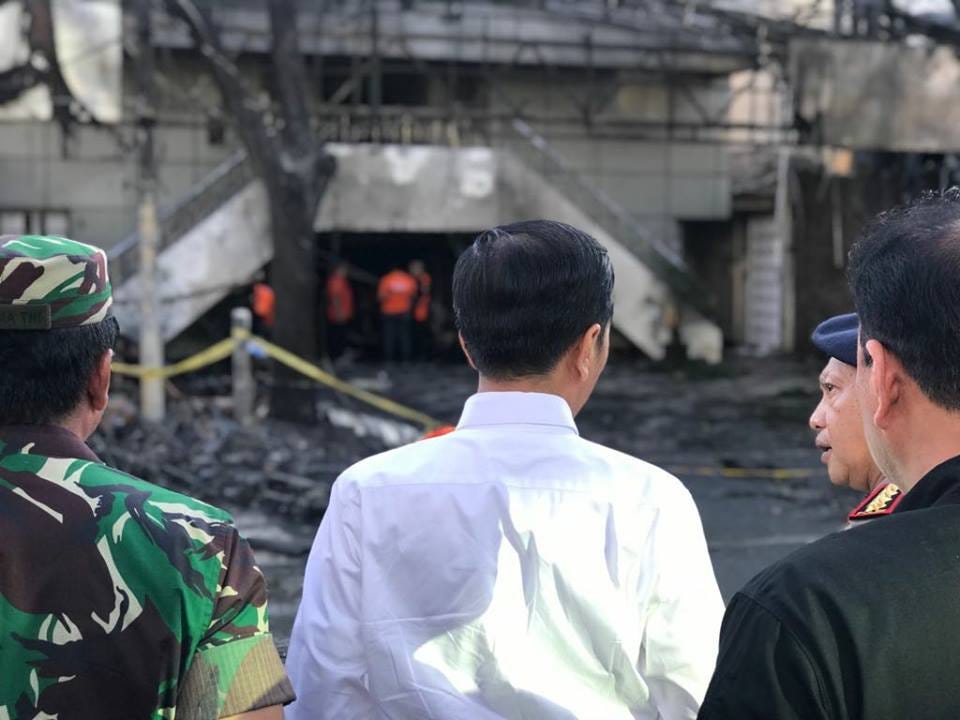A week of terror and tragedy | Corruption fight continues | Rate hiked at last | Indonesia Intelligencer (May 12-18)
Welcome to this free edition of Indonesia Intelligencer, your concise guide to all of the week’s most important news from the archipelago. If you have not already subscribed to I.I., you are receiving this email because you are signed up for the Coconuts Jakarta or Coconuts Bali newsletters.
We’ve got a special offer for all new and existing subscribers to COCO+ (Coconuts Media’s membership program that gives readers access to unlimited Coconuts.co stories each month as well as all sorts of special events and promotions). Until May 31, you can get a code for a free, month-long subscription to Indonesia Intelligencer (which can be used for new subscriptions, added to your existing subscription, or given away to a friend).
You can get all the details on this offer right here. Thanks for reading and have a great weekend.
The Terror Attacks in Indonesia

Timeline of terror
The attacks were precipitated in part by last week’s deadly riot at the Mobile Brigade Command Center (Mako Brimob) detention facility, which was allegedly instigated by dozens of prisoners with ties to Jemaah Ansharut Daulah (JAD), a terrorist network loyal to Islamic State (IS).
Indonesian police say both the riot and subsequent bombings were done based on instructions from IS as part of their global terror strategy, with the propaganda success of the riots leading IS to encourage more attacks from followers. The terror group has claimed responsibility for all the attacks.
On Sunday morning, three churches in Surabaya were attacked by suicide bombers. Chillingly, the attacks were all committed by the members of a single family. The latest police report lists 18 killed from the attacks, including 12 civilians and the four children from the bombers’ family, aged 8-19.
Sunday night, three members of a family of six were killed after homemade bombs exploded in their apartment in Sidoarjo, a town near Surabaya. Police say the detonation was premature and that family members had been planning another attack.
On Monday morning, another suicide bombing took place at Surabaya Police headquarters, carried out by a family of five on two motorcycles. One police officer was killed as well as all members of the family except for an 8-year-old girl, who miraculously survived. Six civilians and four officers were wounded.
The father of the family behind the church bombings was the head of JAD’s Surabaya chapter. Police say the family in Sidoarjo and the family behind the attack on the Surabaya police station were members of the same group.
On Wednesday, a group of four men armed with swords attacked a police station in Pekanbaru, the capital of Riau. One police officer was killed after being hit by the perpetrator’s car, and all four perpetrators were shot dead. Police say they were part of a different IS-linked group called the Indonesian Islamic State (NII).
Also on Wednesday, in Jakarta’s satellite city of Tangerang, police raided three sites and arrested four suspected of training recruits for JAD.
In addition, counter-terrorism squad Densus 88 has arrested numerous terror suspects in East Java as well as Sumatra, including Medan and Riau. In East Java, a total of 23 alleged militants have been arrested and four shot dead.
Today (March 18), prosecutors demanded the death penalty for radical Islamic cleric Aman Abdurrahman in his trial at the South Jakarta District Court. Abdurrahman is alleged to be the spiritual leader of JAD in Indonesia and is on trial for ordering numerous hits in the country, including the 2016 terrorist attack in Jakarta. Police have stepped up security at the trial in anticipation of any attacks.
Critical reactions
Surabaya and the ISIS family (The Interpreter): Analysis by Sidney Jones, director of the Institute for Policy Analysis of Conflict and one of the preeminent experts on terrorism in Indonesia
The involvement of families leaving or returning from ISIS has several implications. It means deradicalisation has to happen as a family – it can’t only be aimed at the men. And deradicalisation programs cannot just be aimed at inculcating nationalism or exposing extremists to other interpretations of Qur’anic texts. They have to address how families as a whole, often indoctrinated into believing that anyone outside ISIS is the enemy, can be persuaded to change their objectives as individuals and as a family unit.
Deadly attacks a sign of Indonesia’s changing terror landscape? (Australian Strategic Policy Institute)
As one recent study carefully noted, Indonesians aren’t lured into joining ISIS simply because of its ideology or propaganda. Instead, the study argues that local political and religious dynamics are central issues. These include, among others, the pre-existing debates over the role of Islam in public and private life; the lack of restrictions and uneven implementation of legislation on social, political, and religious organisations; and the intra-jihadi community competition whereby IS affiliation is used to bolster the credentials and agendas of some clerics and personalities.
Indonesia is Islamic State’s new frontline (Asia Times)
JAD is expected to see the Surabaya attacks as a model for future operations against security forces, still their main target, and to continue its campaign of terror against Christian congregations and other ethnic and religious minorities.
Instead of the bulkier pressure cooker device favored so far, the Surabaya attackers assembled scores of pipe-bombs, easier to conceal but packed with high-explosive TATP, or acetone peroxide, made from readily available retail products.Call to evaluate ways we practice Islam (Jakarta Post) An essay by Lailatul Fitriyah, a Ph.D student in theology at University of Notre Dame, which is representative of many Indonesians who have argued against denying the role religion plays in terrorism in the wake of the attacks.
Such explosions happened because we have normalized religious discrimination through our TV programs, the preachers we listen to and the arrogance of Muslim vigilante groups that raid open eateries during Ramadan. This strain of religious violence is in our political campaigns, our commercial products and our consumerist activities. In a nutshell, we devour violence.
Many things have been said about the factors that contribute to the acts of terrorism in Indonesia, the country with the world’s largest Muslim population. However, a bigger issue is how we Indonesian Muslims should appropriately respond to the violence.
When parents take their children to die in jihadist suicide bombings, what can be done? (The Conversation)
People are shocked that the perpetrators brought their children in the attacks.
There is, however, a rational parental choice behind these acts, based on their belief that a reward for their amaliyah (the term jihadists use to refer to field action) is waiting for them in the afterlife. They believe they will be together again in heaven.
Business
Finmin says Indonesian economy, investment unaffected by bombings: Indonesia Finance Minister Sri Mulyani Indrawati said that the government’s handling of this week’s terrorist attacks will maintain investor confidence in the county’s security. She said that, “the people's focus on the economy is increasing, and it is in our best interest not to let terrors eliminate the trust and positive perception on our economy.”
BI finally raises key interest rate: After weeks of speculation, Bank Indonesia finally hiked its benchmark interest rate by 25 basis points to 4.50% in a bid to bolster the fragile rupiah, which has generally been trading above IDR14,000 per US dollar this week. This is the first benchmark interest rate hike since November 2014.
Biggest trade deficit in 4 years: Indonesia recorded a US$1.62 billion trade deficit in April — the country’s largest deficit in four years. The deficit was driven by a sharp increase in imports of oil and consumption goods, up 34.68% from a year earlier, even though exports rose by 9.01% in the same period.
A million tons of imported rice: The Trade Ministry has approved the import of 500,000 tons of rice into Indonesia after it agreed to import the same amount earlier this year in a bid to push down the increasing price of the staple food, which is currently above the government-set ceiling. The rice will be imported from countries such as Vietnam, Thailand, India, and Pakistan.
Trumpland: Critics of Donald Trump say the US president stands to directly benefit from Chinese government investment in the construction of an Indonesian theme park and resort. Trump’s company is building the theme park and a larger real estate project under cooperation with Indonesian billionaire Hary Tanoesoedibjo’s MNC Land, who this week confirmed that it hired Chinese-owned company Metallurgical Corp. to build the park. There has been widespread speculation that Trump’s recent vow to help Chinese phone maker ZTE was made in connection to the investment move.
Greenpeace cut ties with APP: Greenpeace is backing out of its support for a landmark anti-deforestation commitment by Indonesian paper firm Asian Pulp & Paper Group (APP) after the environment activist group found that other firms linked to APP’s parent company, Sinar Mas, has cleared 8,000 hectares of forests and peatlands in Borneo since 2013.
Manulife and kicking: Manulife Indonesia reported strong business growth for 2017, scoring a year-on-year growth of 19% in new premium customers to IDR4.4 trillion as well as a comprehensive income increase of IDR2.6 trillion, up 290% from 2016. The insurance company now covers more than 2.4 million customers in Indonesia.
Garuda-Sriwijaya codeshare: Flag carrier Garuda Indonesia and private airline Sriwijaya Air have agreed to codeshare domestic flight routes, which will see both airlines covering an estimated 52% of domestic routes. The codeshare partnership will also allow the two airlines to operate and market flights together.
Recommended read
Indonesia ‘absolutely should be booming’ says HSBC country head (Nikkei Asian Review)
The macroeconomic side is as good as they can get. Inflation is 3-3.5%, the rupiah has been stable, there are lots of reserves, interest rates have come down to single digits. What is not to like? But for whatever reason, domestic consumption is still slow.
Politics
President urges swift passage of Terrorism Law revision
Following the bombings in Surabaya, President Joko Widodo told the parliament to work quickly to pass a draft revision to the 2003 Terrorism Law as soon as possible or he would pass a Perppu (Government Regulation in Lieu of Law), which would have largely the same effect, by end of June.
The proposed revision to the Terrorism Law would give police more abilities aimed at proactively preventing terrorist threats, including the ability to detain suspects without trial for longer, arrest people for spreading hate speech and radical content, or for taking part in paramilitary training or joining certain proscribed groups.
Activists have warned that some of the suggested revisions go against the basic principles of human rights and could easily be misused if lawmakers don’t come up with a sufficiently narrow definition of “terrorist” (which was a sticking point that prevented the revision’s passage earlier this year).
Chief Security Minister Wiranto said that the leaders of all political parties are resolved to pass the revision before Jokowi’s end-of-June deadline.
W. Java gubernatorial debate debacle: The second debate among the four candidates competing in the West Java governor’s race (the most important and closely monitored of the upcoming regional elections on June 28) ended in chaos after PKS candidate Sudrajat and his running mate Ahmad Syaikhu held up a shirt with the controversial slogan “Ganti Presiden 2019” (Replace the President in 2019). Perhaps hoping to tap into anti-Jokowi sentiment to bolster their low poll numbers, Sudrajat and and Syaikhu now face the possibility of being banned from the race’s final debate if their stunt is found to be a violation of campaign regulations.
Indonesia looks to India for SCS backup: Maritime Affairs Minister Luhut Binsar Pandjaitan, giving a lecture on bilateral relations with India ahead of Prime Minister Narendra Modi’s upcoming visit, said Indonesia rejects power projection by any single nation in the South China Sea and argued that ties with India were an important aspect of maintaining the balance of power in the SCS and the region as a whole.
Recommended reads
Is Indonesia’s Widodo soft on security? (Asia Times) Terror attacks at Surabaya, the most lethal seen in a decade, give president's political opponents ammunition to hit his supposedly 'weak' leadership
Opposition forces are already circling, sensing an opportunity to capitalize on the incident. Deputy Speaker of the House of Representatives – and perpetual thorn in Widodo’s side – Fadli Zon blamed ‘weak leadership’ in a series of tweets offering support to victims and criticisms following the attacks.
The comments prompted heavy condemnation online, where netizens accused the Gerindra Party co-founder of exploiting tragedy for personal and political gain. In the lead-up to the 2019 elections, Fadli’s comments show few issues will be off-limits on the campaign trail.
A Catch-22 From China That Could Derail Indonesia’s Widodo (South China Morning Post): To win votes, the Indonesian leader needs Chinese cash to build railways and ports. To build those railways and ports, he needs to accept the Chinese workers who are losing him votes
Other News and Notable Features
Fight against corruption continues
After being captured in 2016, authorities have finally managed to recover almost all of the IDR169 billion (US$12 million) Samadikun Hartono, the former president commissioner of Bank Modern, was convicted of embezzling in 2004. A symbolic payment of IDR87 billion in cash, derived from Samadikun’s sold assets, was sent to Bank Mandiri HQ on Thursday.
The Transportation Ministry’s former sea transportation director general, Antonius Tonny Budiono, was sentenced to five years in prison on Thursday for accepting bribes related to harbor-dredging permits.
The Corruption Eradication Commission (KPK) on Wednesday apprehended the regent of South Bengkulu as well as three other suspects who were in the middle of an illicit transaction regarding a failed infrastructure project.
Recommended reads
Where do Bali’s least popular tourists come from? Indonesian locals have a reputation that is hard to shake (South China Morning Post): It is hard being an Indonesian visitor on the Indonesian tourist island of Bali, where motorcycle rental businesses will tell you there are no rides left (there are) and restaurants will say they are full (but let in groups of foreigners)
Indonesia: a concrete block and a hard case (The Interpreter): On the dramatic protests by farmers fighting against a cement factory in Central Java’s Kendeng mountain region and their lamentable lack of success.
Over the next few days, the protest swelled with about 50 supporters. Every morning and every evening, the farmers feet still in cement, supporters hoisted them onto the back of trucks and wheeled them in and out of the protest site on trolleys. At night, they lay flat on their backs, feet on the floor below them – even going to the toilet required three assistants to move them. The cement blocks were too heavy to walk in.
The protest ended after eight days when one woman, Ibu Patmi, collapsed and died after having the blocks removed.
It has now been more than a year since Ibu Patmi passed away, and still the dispute drags on. Although the farmers have not given up, the issue of Kendeng has been noticeably absent in the lead-up to the election for the next governor of Central Java.
Top stories from Coconuts Jakarta






